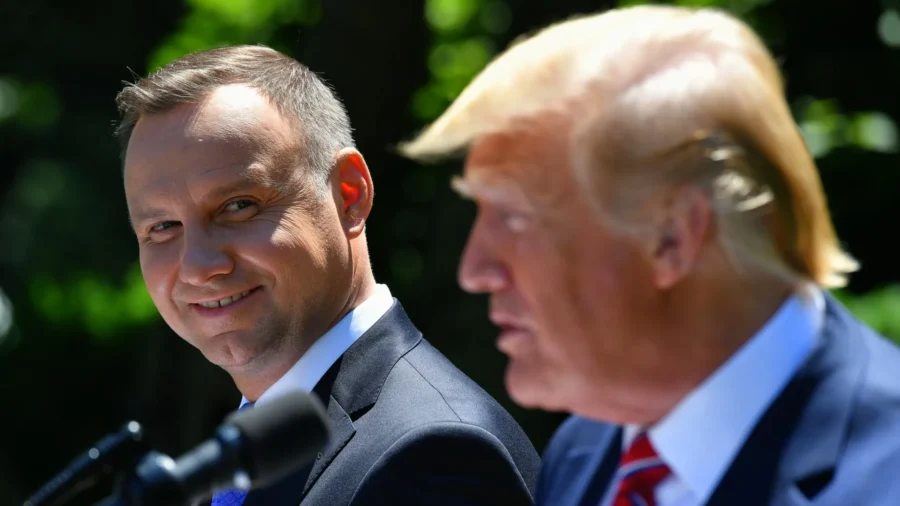Polish President Andrzej Duda said he believes former President Donald Trump could end the war in Ukraine in a matter of days if elected president of the United States again, saying he “keeps his word.”
President Duda made the remarks at a news conference in Rwanda on Feb. 7 when a reporter asked him whether President Trump’s claim that he could end the Russia-Ukraine conflict within 24 hours could be seen as “credible.”
“I can give you my personal experience as president of the Republic of Poland who used to work with President Donald Trump when he was in office,” President Duda said.
“The commitments that he made [with] myself were kept … So, if there was a promise made by President Donald Trump, if President Donald Trump promised something to me, he kept his word. So, looking from this vantage point, I can say, yes, President Trump keeps his word [and] when he says something, he takes it seriously,” the Polish leader added. “That is as much as I can tell right now.”
President Trump has said on multiple occasions that he could end the war in Ukraine within 24 hours as president by starting negotiations between the warring sides.
Last year, he said during an interview with Britain’s GBNews and Nigel Farage that he would “end that war in one day” if elected president because he “knows [Ukrainian President Volodymyr] Zelenskyy well” and he knows Russian President Vladimir Putin “well.”
Later in the interview, President Trump said that “it would be easy” because “a lot of it has to do with the money,” while “a lot of it has to do with the military” aid that the United States is giving.
“That war has to be stopped. That war is a disaster,” he added. “I’m talking about the human” loss of life, he said, noting that it is “far greater” than what is being reported.
In December, the U.S. Department of Defense revealed in a fact sheet that the United States has committed more than $44 billion in military aid to Ukraine since February 2022, with much of that in the form of presidential drawdown authorities.
Meanwhile, a controversial foreign assistance package that includes $60 billion in funding for Ukraine and $14.1 billion for Israel failed to pass a procedural vote in the U.S. Senate on Feb. 7.
Last month, a Kremlin official said he had no idea how President Trump could end the 23-month-long war, further pointing out that there hasn’t been any contact between Russian diplomats and President Trump to discuss such negotiations.
“No, we do not have an understanding of how this can be implemented. There have been no contacts to this effect,” Kremlin spokesman Dmitry Peskov said in mid-January, according to Kremlin-aligned news agency RIA Novosti, Newsweek reported.
Kremlin’s Goals in Ukraine Remain Unchanged
Nearly two years after Russia sent tens of thousands of troops into Ukraine, the Kremlin said on Feb. 7 that the goals of what Russia calls its “special military operation” remain unchanged.
Mr. Peskov said Moscow’s objectives in Ukraine were still relevant, before describing what they were.
“Demilitarisation, denazification, [and] ensuring the safety of people living in those regions that have already become Russian, protecting them from direct attacks and actually saving their lives,” Mr. Peskov told reporters on a conference call.
“In addition, in a broader sense, it is to ensure the security of the Russian Federation against the background of attempts to destroy Ukraine’s neutral status, suck it into NATO, and further drag NATO’s military infrastructure closer to our country’s borders,” he added.
Ukraine and the West have repeatedly accused Russia of using what they say are false pretexts to wage an unjustified war of colonial conquest which Kyiv has pledged to resist until the last Russian soldier leaves its territory.
Reuters contributed to this report.

